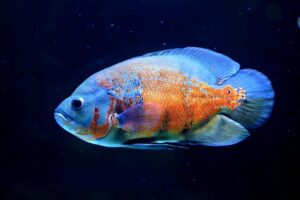Essential Tips for Successfully Caring for Your Oscar Fish
If you’ve chosen to care for an Oscar fish, you’ve welcomed a truly remarkable aquarium inhabitant into your home. Known for their striking appearance and impressive size, Oscars are sure to be the centerpiece of any tank. Their vibrant colors and engaging personalities make them a favorite among seasoned aquarists. However, beneath their captivating beauty lies a need for specialized care and attention. Properly caring for an Oscar fish is vital to ensure these stunning creatures thrive and reach their full potential in a home aquarium setting.
In this comprehensive guide, we’ll delve into the most important aspects of Oscar fish care, including aquarium setup, health maintenance, and dietary needs. By the end of this article, you’ll have the knowledge you need to create a happy and healthy environment for your Oscar fish.
Creating the Perfect Tank Environment for Your Oscar Fish
When setting up an aquarium for your Oscar fish, several key factors must be considered to create a thriving habitat. First and foremost, ensure that your aquarium is spacious enough for these large fish. Oscars can grow up to 14 inches in length, so a minimum tank size of 55 gallons is essential to provide ample swimming space and promote healthy growth.
Next, focus on establishing a suitable environment that mimics their natural habitat. Adding a substrate, such as gravel or sand, at the bottom of the tank will allow your fish to exhibit natural behaviors, including burrowing. Additionally, incorporating various hiding spots and decorations, like rocks and driftwood, will help your Oscars feel secure and reduce stress.
Finally, prioritize maintaining excellent water quality by investing in a high-quality filtration system and performing regular water changes. A clean and well-maintained aquarium is crucial for the health and well-being of your Oscar fish.
Understanding the Nutritional Needs of Your Oscar Fish
Providing your Oscar fish with a balanced and nutritious diet is essential for their overall health and happiness. To ensure they receive optimum nutrition, offer a variety of food options, including high-quality pellets, flakes, and both live or frozen foods. Pellets designed specifically for Oscar fish should form the core of their diet, as these products are packed with essential vitamins and minerals that promote growth and development.
In addition to pellets, incorporating protein-rich foods such as bloodworms, brine shrimp, and small fish can enhance their diet and provide the necessary energy for active living. It’s best to feed your Oscars smaller portions multiple times a day rather than a single large meal to prevent overeating and digestive issues.
Moreover, keeping the tank clean by removing any uneaten food will help maintain water quality and a healthy environment for your fish.
Prioritizing Water Quality for the Health of Your Oscar Fish
Maintaining optimal water quality is critical to the health and longevity of your Oscar fish. Poor water conditions can lead to a variety of illnesses that could jeopardize their well-being. Regularly testing the pH, ammonia, nitrite, and nitrate levels in the aquarium is essential to ensure that the water is safe for your fish. These tests will help you determine if any adjustments are necessary to maintain a stable and healthy aquatic environment.
To keep water quality high, aim to change about 25% of the water every two weeks. Using a siphon to clean the substrate during water changes can effectively remove accumulated waste and debris. Additionally, investing in a reliable filtration system will help keep the water clean and clear, providing a safe habitat for your Oscar fish.
Identifying and Addressing Common Health Issues in Oscar Fish
Addressing health issues promptly is crucial for the well-being of your Oscar fish. One common health problem is Ich, a parasitic disease that manifests as white spots on the fish’s body, rapid gill movement, or rubbing against aquarium objects. If you notice these symptoms, it’s important to raise the water temperature to 30°C (86°F) and introduce Ich-specific medication to treat the condition effectively.
Another prevalent issue is fin rot, indicated by frayed or deteriorating fins. To combat fin rot, it’s vital to improve water quality, maintain stable temperature and pH levels, and administer appropriate medication as necessary. Regularly inspecting your Oscar fish for any signs of illness and taking immediate action can help keep them healthy and thriving.
Creating a Healthy Habitat for Your Oscar Fish
Once you have resolved any health concerns affecting your Oscar fish, it’s crucial to provide a stable and healthy environment. Start by ensuring that your tank is spacious enough, with a recommended minimum size of 55 gallons to accommodate their growth—Oscars can reach lengths of up to one meter. The water temperature should ideally be maintained between 74°F and 81°F, with a pH level ranging from 6.5 to 7.5.
Utilize a dependable filtration system to keep the water clean and free from harmful toxins. Regularly perform water changes of 20-30% every two weeks to eliminate waste and maintain optimal water quality. Enhancing your tank with decorations such as stones, driftwood, and live plants can help mimic their natural habitat, providing essential hiding spots that reduce stress and aggression.
Ensure that your Oscar fish enjoys a well-balanced diet consisting of high-quality pellets complemented by occasional live or frozen food to keep them healthy and vibrant.
Answers to Common Questions About Oscar Fish Care
Can Oscar fish coexist with other fish species in the same tank?
Yes, Oscar fish can be kept alongside other fish species, but it’s important to conduct thorough research to ensure compatible tank mates. Larger cichlids and catfish are generally good companions, but always consider the temperaments and sizes of the fish involved.
How frequently should I clean my Oscar fish’s tank?
To maintain a healthy environment for your Oscar fish, regular tank cleaning is essential. This includes performing water changes and cleaning the filter to prevent the buildup of waste and pollutants. Consistency in cleaning will significantly contribute to the overall health of your fish.
Is it safe to use tap water for filling the aquarium?
Yes, you can use tap water to fill your aquarium. However, it’s crucial to treat the water with a conditioner before adding it to the tank to eliminate chlorine and other harmful substances that could endanger your fish.
What is the average lifespan of an Oscar fish?
Oscar fish typically have an average lifespan of 10 to 15 years. With proper care, including a balanced diet, clean water, and a suitable tank environment, their lifespan can be extended, allowing you to enjoy their company for many years.
How can I determine the sex of my Oscar fish?
To differentiate the sex of your Oscar fish, observe their behavior and physical characteristics. Males are often larger and possess a more pronounced dorsal fin, while females may have a rounder body shape and a broader abdomen. Understanding these distinctions can help you in breeding or tank mate selection.
Caring for an Oscar fish requires a well-planned approach that includes an adequately sized tank with effective filtration and temperature control. Providing a nutritious diet is also vital, as Oscars are omnivores that thrive on a varied menu, including premium pellets, fresh or frozen protein sources, and occasional vegetables.
Maintaining high water quality is essential for the health of your Oscar fish. Regular water changes, monitoring ammonia, nitrite, and nitrate levels, and keeping a stable pH are all crucial components of effective water quality management.
Addressing health issues promptly is equally important, as Oscars are susceptible to diseases like Ich, fin rot, and swim bladder problems. Monitoring for symptoms, quarantining new fish, and following appropriate treatment protocols will help keep your Oscars healthy and vibrant.
Creating a suitable habitat also involves thoughtful tank design and providing hiding spaces for your Oscar fish. Adding plants, rocks, and driftwood will not only replicate their natural environment but also promote mental stimulation and reduce stress.
By following these guidelines, you can ensure the health and longevity of your Oscar fish, enriching your aquarium with their beauty and personality for years to come.
The post Caring for an Oscar Fish appeared first on Unity Pets.
The Article Caring For An Oscar Fish was found on https://limitsofstrategy.com




I really appreciate the insights you’ve shared about Oscar fish care! I remember when I first got my Oscar a few years back—his name is Charlie. Setting up the tank felt like a mini-project; I ended up using a mix of rocks and plants that not only suited the aesthetics but also provided him with hiding spots, which I’ve learned is essential for their well-being.
Your insights on Oscar fish care really resonate with me. I’ve had my Oscar for about three years now, and I can attest to how engaging their personalities can be. It’s fascinating how they can recognize their owners and even follow you around the tank.
It’s interesting to hear about your experience with your Oscar. They really do have such unique personalities. I remember when I first noticed how mine would react to me; it felt like we were having a little dance whenever I approached the tank. It’s amazing how fish can form these bonds, which adds a whole new layer to having an aquarium.
I completely relate to that feeling of having a little dance with your Oscar. Watching them react to my presence truly does feel like a special connection, almost like they recognize me. It’s fascinating how intelligent they are; they seem to be aware of our routines. My Oscar even swims up to the glass when it’s feeding time, almost like a little reminder that I need to show up.
I recently came across an article that sheds light on how waste affects marine life, and it really deepened my appreciation for the unique bonds we form with our aquarium pets.
‘Waste’s Impact on Marine Life: A Growing Concern’
https://therickmusic.com/wastes-impact-on-marine-life-a-growing-concern/.
I can really relate to that feeling of connection with your Oscar too. It’s incredible how they seem to recognize us and respond in such individualized ways. My fish do similar things; it’s like they have a sense of who I am and what to expect. Watching them interact with us almost feels like they’re part of our family.
I recently discovered an article that really highlights how our everyday waste impacts marine life, and it’s a thought-provoking read that made me reflect even more on the meaningful connections we build with our aquatic friends.
‘Waste’s Impact on Marine Life: A Growing Concern’
https://therickmusic.com/wastes-impact-on-marine-life-a-growing-concern/.
It’s so great to hear about your connection with your Oscar. Those moments when they come to the glass, reminding us that it’s feeding time, really do highlight the unique bond we share with our aquarium friends. I find it fascinating how they seem to remember our routines and how they engage with us in their own way.
It’s fascinating how caring for an Oscar fish can be such a rewarding journey, not just for the fish but for us as keepers as well. I fondly remember my first Oscar, who had quite a personality. He seemed to recognize me and would swim excitedly to the side of the tank whenever I approached.
It’s great to hear your experience with your Oscar fish. That connection you felt is really something special. Oscars can be surprisingly social and even interactive, which makes them different from many other fish out there. They have their own unique personalities, right?
I appreciate the focus on the unique needs of Oscar fish in your post. It’s evident that they require a dedicated approach to both their environment and care. From my experience, the importance of tank size cannot be overstated; Oscars are not only large fish but also quite active and curious. I’ve found that providing them with a spacious aquarium significantly impacts their behavior and overall health.
You make an excellent point about tank size and the active nature of Oscars. In my experience, it really does feel like giving them more space allows them to express their natural behaviors more freely. I’ve noticed that when they have more room, they tend to explore more, which seems to make them less stressed and more interactive with their surroundings.